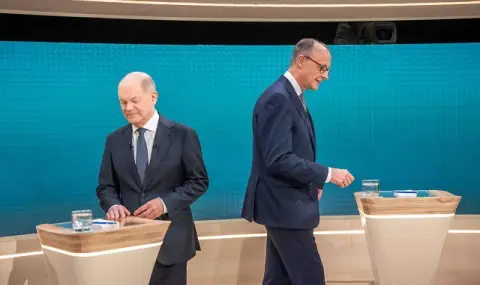A day after winning first place in the early parliamentary elections in Germany, Friedrich Merz's German conservatives proposed marriage at the expense of Olaf Scholz's Social Democrats, who have governed the country so far, France Presse summarizes.
“I am determined to hold constructive, good and quick talks with the Social Democrats“, said future Chancellor of Germany Merz. He gave himself two months, until Easter, to overcome differences with the Social Democrats, especially on budget issues, so that the country has an efficient government.
Merz noted that time is running out for Germany, and the country is facing major upheavals - an economic model that no longer works, the risk of trade wars with the United States, a reversal in the alliance with a historic American ally, now tempted by a rapprochement with Russia.
“The world is not waiting for us, things continue to change rapidly,“ Merz said.
However, the victory of the Christian Democrats was smaller than expected. They won 28.6 percent. Now Merz, a veteran of the German political scene but who has never held ministerial posts, must face enormous tasks, says political scientist Cornelia Wohl. Germany must be able to act quickly so as not to be a bystander while Trump and Putin shape the future, Merz said.
The elections were marked by the record result of the far-right “Alternative for Germany“, which received 20.8 percent. This puts Merz under pressure.
And the leader of “Alternative for Germany“ Alice Weidel has declared her ambition to become the first party in the country in the next four years and overtake the conservatives.
Internationally, Berlin's partners want Germany to return to its role as a driving force in the EU, at a time when Trump is shaking the continent's security architecture with some actions.
An absolute priority will be to support European efforts to strengthen common defense capabilities, Merz said. Noting that the Trump administration is turning its attention away from Europe, he said Europe should prepare for the worst-case scenario in transatlantic relations.
Merz assured that his party would not ally with the far right and therefore had no choice but to reach out to the Social Democrats, who achieved around 16 percent, their worst performance in 80 years.
The country is thus set to get a grand coalition, something that conservative Chancellor Angela Merkel preferred in three of her four terms.
The two parties would together control 328 seats out of a total of 630 in the new Bundestag. But the gap between them has widened since Merz departed from the centrist line the party followed during Merkel's chancellorship and began making radical proposals to combat illegal immigration.
The Social Democrats, despite their weakened position, must carefully negotiate this marriage of convenience, trying to raise the stakes on reforming the rules on the national debt - another thorny issue between the two parties.
The elections complicated the situation because, in addition to weakening the moderate parties, they gave a blocking minority to the “Alternative for Germany” and the far-left party “The Left“, which surprised with a result of 8.7 percent.
In the new parliament, a possible camp between the Christian Democrats, the Social Democrats and the Greens will not have the two-thirds majority needed for constitutional reforms, such as the one on the debt brake.
That is why Merz hinted that he could try to avoid this obstacle by pushing the reform through the current lower house of parliament, before its dissolution in a month, and in which he could easily win a two-thirds majority.
